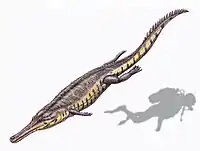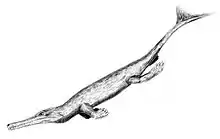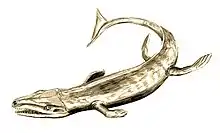Tyrannoneustes
Tyrannoneustes is an extinct genus of geosaurine metriorhynchid crocodyliform from the Callovian stage Oxford Clay Formation of England and the Marnes de Dives of France. It contains a single species, Tyrannoneustes lythrodectikos, meaning "blood-biting tyrant swimmer".[1][2][3] The genus was rediscovered after a century of storage in a museum basement after being unearthed by fossil hunter Alfred Nicholson Leeds between the years of 1907 and 1909. Its lower jaw measured about 26 inches long and its teeth were blade-like, likely built to attack prey as large or larger than itself, similar to the Late Jurassic Dakosaurus, Torvoneustes, and Plesiosuchus.[3]
| Tyrannoneustes Temporal range: Callovian | |
|---|---|
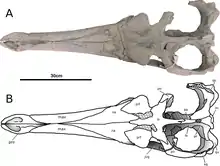 | |
| Skull | |
| Scientific classification | |
| Kingdom: | Animalia |
| Phylum: | Chordata |
| Class: | Reptilia |
| Suborder: | †Thalattosuchia |
| Family: | †Metriorhynchidae |
| Subfamily: | †Geosaurinae |
| Genus: | †Tyrannoneustes Young et al., 2013 |
| Type species | |
| †Tyrannoneustes lythrodectikos Young et al., 2013 | |
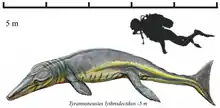
Restoration
References
- Waskow, K., Grzegorczyk, D. & Sander, P.M. The first record of Tyrannoneustes (Thalattosuchia: Metriorhynchidae): a complete skull from the Callovian (late Middle Jurassic) of Germany. PalZ 92, 457–480 (2018). https://doi.org/10.1007/s12542-017-0395-z
- Young, M. T.; De Andrade, M. B.; Brusatte, S. L.; Sakamoto, M.; Liston, J. (2013). "The oldest known metriorhynchid super-predator: A new genus and species from the Middle Jurassic of England, with implications for serration and mandibular evolution in predacious clades". Journal of Systematic Palaeontology: 1. doi:10.1080/14772019.2012.704948.
- Charles Choi (2013-01-30). "Ancient 'super-croc' fossil discovered in museum drawer: And they didn't call enormous Tyrannoneustes 'blood-biting tyrant swimmer' for nothing".
This article is issued from Wikipedia. The text is licensed under Creative Commons - Attribution - Sharealike. Additional terms may apply for the media files.
